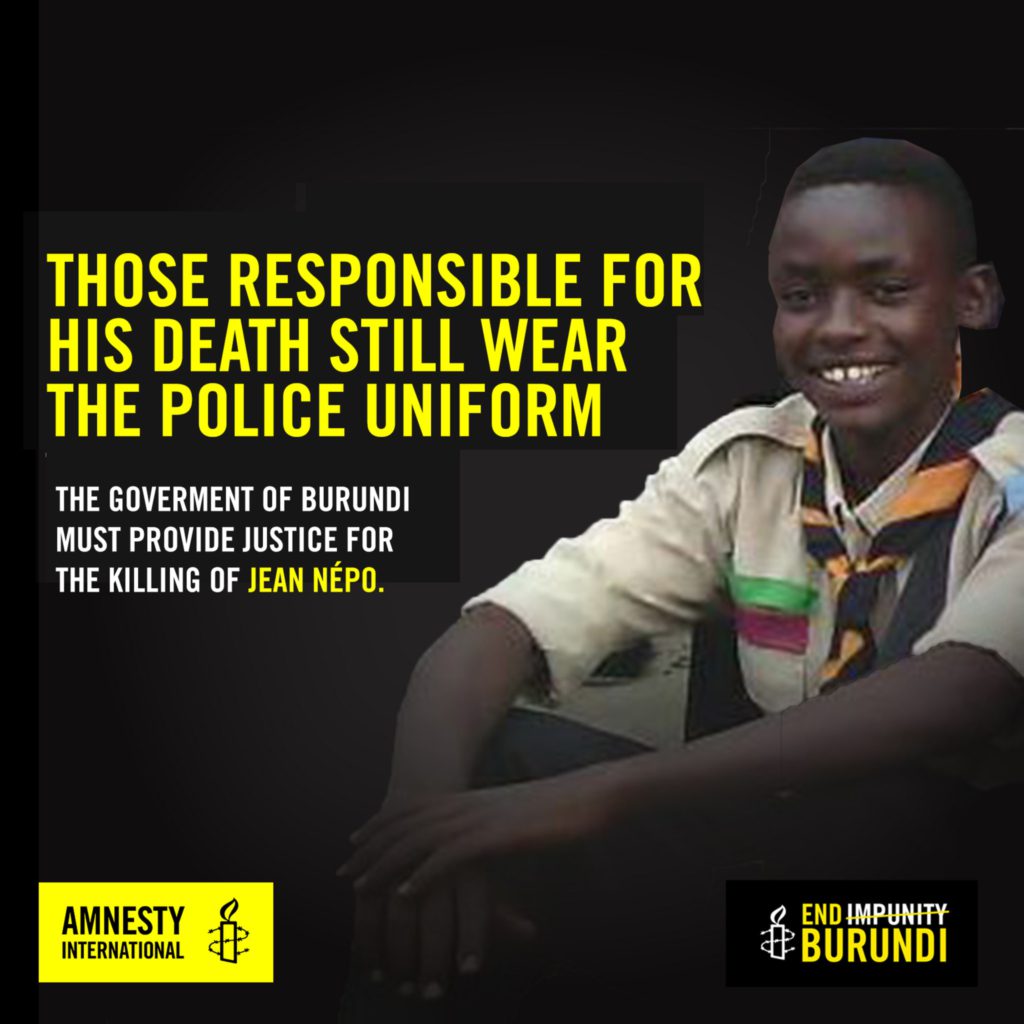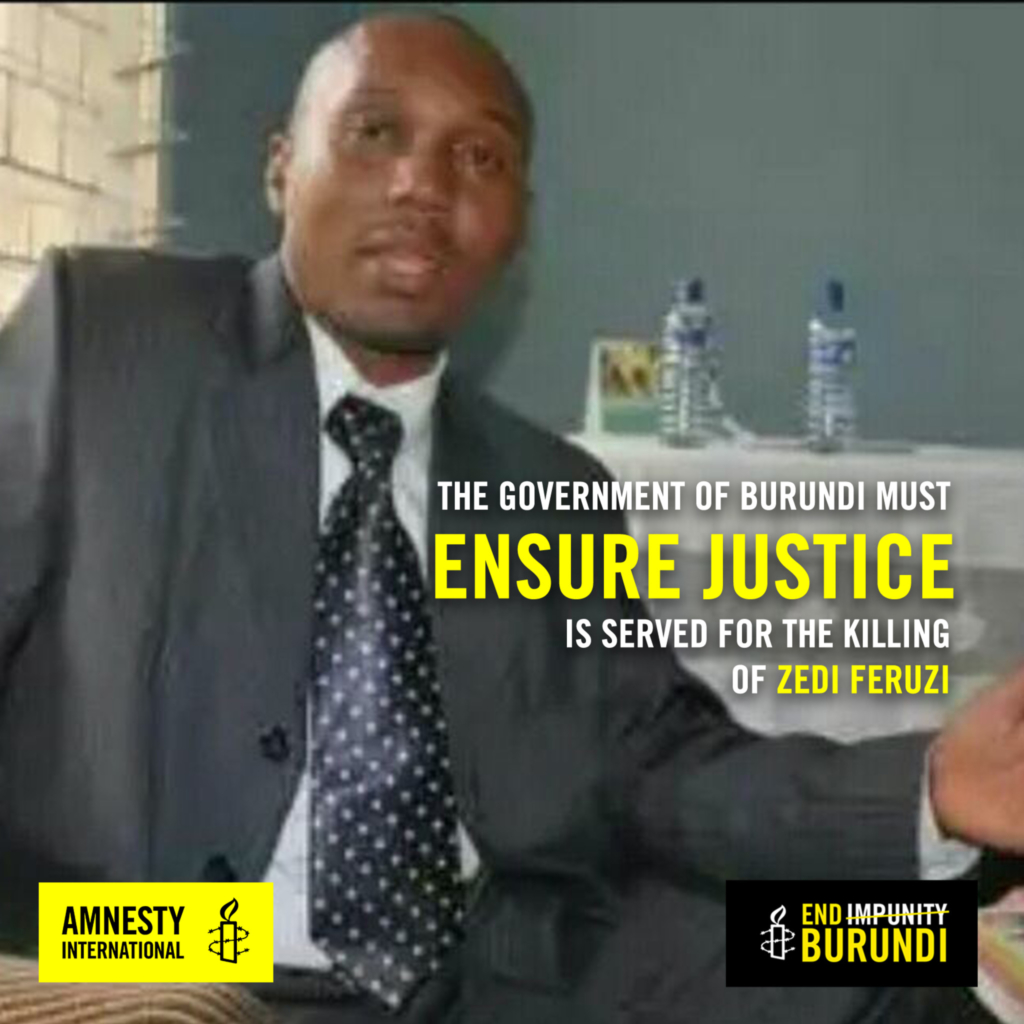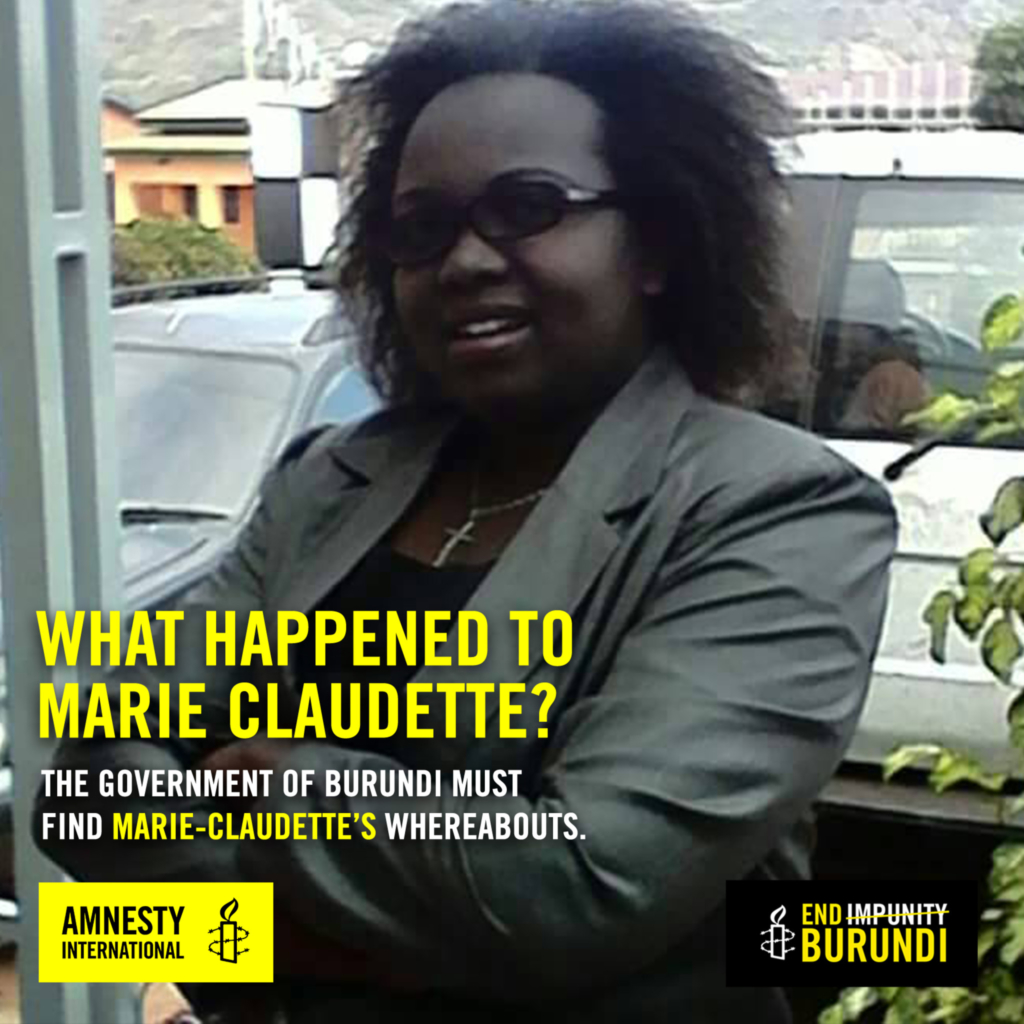Jean-Népomucène Komezamahoro wanted to be a priest or join the army like his older brother. Popularly known as Jean-Népo, he was shot and killed by police on 26 April 2015 at a protest in Ngagara, a suburb of the capital Bujumbura. He was the first known victim of the brutal repression of those opposed or perceived to be opposed to President Pierre Nkurunziza’s decision to seek a third term in office in April 2015. Witnesses and relatives said that Jean-Népo had not even taken part in the protest.

As Burundians vote in a referendum on proposed changes to the constitution on 17 May, tensions are increasing once again. Reports of intimidation, harassment and attacks against those opposed to the constitutional changes are becoming widespread. On 27 March 2018, Iwacu published a heart-breaking article on the death of Simon Bizimana, a farmer who was arrested for allegedly refusing to register to vote in the referendum. In a video that has been circulating on social media, Simon is shown answering questions related to his refusal to register to vote on religious grounds. According to witnesses who spoke to Iwacu, Simon was badly beaten up during his arrest on 13 February in Cendajuru commune. The next day he was transferred to Cankuzo, the capital of the province of the same name. It is believed he died of injuries sustained from the beating.
If passed, the changes to the constitution may allow President Nkurunziza to run again and seek to stay in power until at least 2034.
Amnesty International
If passed, the changes to the constitution may allow President Nkurunziza to run again and seek to stay in power until at least 2034. Many Burundians, including the main opposition parties and civil society, believe these constitutional revisions will spell the end of any hope for a negotiated solution of the crisis that began in April 2015.
While many predicted there would be political tension when President Nkurunziza first signalled his intention to seek a third term, no one could have predicted the violence that would result. Protests started immediately after his announcement in April 2015 that he would run again. The protests were violently repressed by the security forces. Hundreds were killed in 2015, according to the UN. Security forces started hunting down real or perceived opponents to President Nkurunziza and his political party, CNDD-FDD. Dead bodies started appearing in the streets, rivers and on the shores of Lake Tanganyika.

After a coup attempt on 13 May 2015 failed, killings became widespread and high-profile civilian and military leaders were targeted. In less than six months, the opposition Union for Peace and Democracy – Zigamibaga (UPD-Zigamibaga), which was opposed to President Nkurunziza’s third term, lost its President Zedi Feruzi, after he was killed by the police on 25 May 2015, as well as Patrice Gahungu, its spokesperson, who was killed by unidentified gunmen on 7 September. General Adolphe Nshimirimana, former head of the intelligence service was shot dead on 2 August 2015. His convoy was hit by rockets during a sustained gunfire exchange. Close to President Nkurunziza, his name has been mentioned in connection with allegations of torture and extra-judicial killings, for which he was never investigated.
When in the early hours of Friday 11 December 2015 unidentified armed groups attacked four military sites in Bujumbura, Burundian security forces responded with violent cordon-and-search operations in so-called opposition neighbourhoods. Security forces went from house to house looting homes, arbitrarily arresting people and killing dozens. The next morning, residents ventured out of their homes to find dozens of bodies in the streets of these perceived pro-opposition neighbourhoods. In Musaga neighbourhood, residents stayed inside for most of Saturday as well, while bodies were collected and taken away by the police and Imbonerakure, the increasingly militarised youth wing of the ruling party. A few weeks later, suspected mass graves were uncovered. It is believed that people killed on 11 December were buried in these mass graves in a bid to cover up evidence of the unlawful killings. The government reported that 87 people were killed, including eight military and police. The real number may be much higher.

In 2016, targeted attacks continued to be carried out by security forces and unidentified armed groups at a lower intensity. In April 2016, General Athanase Kararuza, a high-ranking member of the Burundian army, was shot dead together with his wife and his bodyguard. On 13 July, Hafsa Mossi, a member of the East African Legislative Assembly, former Minister and former BBC journalist, was gunned down by unidentified men in Bujumbura. And in the early hours of New Year’s Day in 2017, Emmanuel Niyonkuru, the Minister of Water, Environment and Planning was shot dead in Bujumbura.
As the security forces regained effective control of the country, media effectively silenced by attacks, harassment and intimidation, and human rights organizations shut down, public reporting of targeted killings and bodies being dumped into the streets declined.
Human rights defenders have also paid a huge price for their stand against President Nkurunziza’s third term.
Amnesty International
While many were able to mourn and bury their loved ones killed in the violence, up to now many still don’t know what happened to their relatives. On 10 December 2015, Marie Claudette Kwizera, the treasurer of the human rights organization Ligue Iteka was abducted by the security forces. Her family paid a ransom for her release, but never received any sign of life from her. Jean Bigirimana, a journalist for the newspaper Iwacu, went missing on 22 July 2016. People close to him believe he was abducted by members of the SNR, the national intelligence service. His family and colleagues are still looking for answers.
Human rights defenders have also paid a huge price for their stand against President Nkurunziza’s third term. On 3 August 2015, the day after the killing of General Adolphe Nshimirimana, Pierre Claver Mbonimpa, a well-known human rights activist, escaped an assassination attempt after he being shot in the head. His son-in-law, Pascal Nshimirimana, was not so lucky. He was shot dead in October of the same year. Another family member lost in this violence was Welly Fleury Nzitonda, Pierre-Claver’s son, who was found dead after having been arrested by the police on 6 November 2015.
Currently, five human rights defenders are in detention simply for doing their human rights work. On 26 April 2018, Germain Rukuki was sentenced to 32 years in prison on bogus charges. Emmanuel Nshimirimana, Aimé Constant Gatore and Marius Nizigiyimana were each sentenced to 10 years in prison on 8 March. The three are members of the Burundian NGO Words and Actions for the Awakening of Consciences and the Evolution of Mentalities (PARCEM). Nestor Nibitanga, a former regional representative for the Association the Protection of Human Rights and Detained Persons (APRODH), has been detained without trial since November 2017. They have all been accused of threatening state security, among other charges. Amnesty International considers them prisoners of conscience and is campaigning for their immediate release.
In this highly volatile context, we choose to stand with the victims, and not be complacent or bury our heads in the sand. We choose to face up to the reality of the situation in Burundi and hear the cries for justice. We won’t be defeated. The thousands of victims of the violence in Burundi deserve a voice. Together with the people of Burundi, through the Abacu* [Our People] Campaign, we will keep a candle burning for those we have lost and continue to lose to this senseless violence.
*Abacu Campaign: Since 2015, Amnesty International launched the Abacu (meaning Our People) campaign in to celebrate and honour victims of violence in Burundi.


